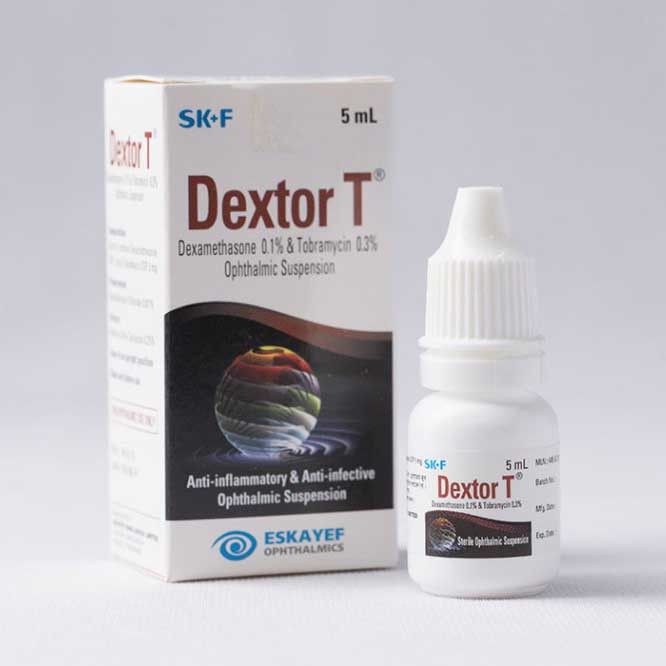Indications
Dextor-T is indicated for steroid responsive inflammatory ocular conditions (palpebral and bulbar conjunctiva, cornea and anterior segment of the globe) where superficial bacterial ocular infection exists. It is also indicated in chronic anterior uveities and corneal injury from chemical radiation or thermal burns, or penetration of foreign bodies. The use of combination with an anti-infective component is indicated where the risk of superficial ocular infection is high.
Pharmacology
Like other amino-glycosides, the bactericidal activity of Tobramycin is accomplished by specific inhibition of normal protein synthesis in susceptible bacteria, but at the present time, very little is known about this action. It is thought that inhibition of protein synthesis is due to an action on ribosome that causes bacterial misreading of messenger RNA. The action of Dexamethasone is to inhibit the phospholipase A2, the first step in prostaglandin synthesis. Also Dexamethasone inhibits the chemo-tactic infiltration of neutrophils into the site of inflammation. The result is that its anti-inflammatory activity is 25 times greater and its overall therapeutic effectiveness 8-10 times greater than that of hydrocortisone.
Dosage & Administration
Eye Drops: Insert 1 drop into the conjunctival sac 3-5 times per day. During the initial 24 to 48 hours, the dosage may be increased to 1 drop every 2 hours.
Eye Ointment: Apply a small amount into the conjunctival sac 3-4 times per day. Slowly close your eyes without blinking. Keep your eyes closed for 1 to 2 minutes.
Pediatric Use: Safety and effectiveness in pediatric patients below the age of 2 years have not been established.
Eye Ointment: Apply a small amount into the conjunctival sac 3-4 times per day. Slowly close your eyes without blinking. Keep your eyes closed for 1 to 2 minutes.
Pediatric Use: Safety and effectiveness in pediatric patients below the age of 2 years have not been established.
Interaction
No specific interaction studies were performed with Dextor-T eye drops. In case of concomitant therapy with other topical ophthalmic medicines, an interval of 10 minutes should be allowed between successive applications.
Contraindications
Epithelial herpes simplex keratitis (dendritic keratitis), vaccinia, varicella, and many other viral diseases of the cornea and conjunctiva. Mycobacterial infection of the eye. Hypersensitivity to any component of the medication.
Side Effects
The most frequent adverse reactions to topical ocular Tobramycin are hypersensitivity and localized ocular toxicity including lid itching, swelling and conjunctival erythema. This reaction occurs in less than 4% of patients. The reactions due to the steroid component are; elevation of intraocular pressure with possible development of glaucoma, and infrequent optic nerve damage; posterior sub capsular cataract formation; and delayed wound healing.
Pregnancy & Lactation
Pregnancy: There were no adequate and well controlled studies in pregnant women. This ophthalmic solution should be used during pregnancy only if the potential benefit justifies the potent risk to the fetus.
Nursing Mothers: It is not known whether topical administration of corticosteroids could result in sufficient systemic absorption to produce detectable quantities in human milk. Because many drugs are excreted in human milk, caution should be exercised when this ophthalmic solution is administered to a nursing woman.
Nursing Mothers: It is not known whether topical administration of corticosteroids could result in sufficient systemic absorption to produce detectable quantities in human milk. Because many drugs are excreted in human milk, caution should be exercised when this ophthalmic solution is administered to a nursing woman.
Precautions & Warnings
The possibility of fungal infections of the cornea should be considered after long-term steroid dosing. As like other antibiotic preparations, prolonged use may result in overgrowth of non-susceptible organisms, including fungi. If super infection occurs, appropriate therapy should be initiated. Cross-sensitivity to other aminoglycoside antibiotics may occur; if hypersensitivity develops with the product, discontinue use and institute appropriate therapy
Overdose Effects
Overdose through local administration is not known. In case of accidental oral intake, specific measures to reduce resorption should be taken. There is no specific antidote.
Therapeutic Class
Ophthalmic steroid - antibiotic combined preparations
Storage Conditions
Store at room temperature. Close the bottle immediately after use. Do not use for longer than one month after opening the bottle.


